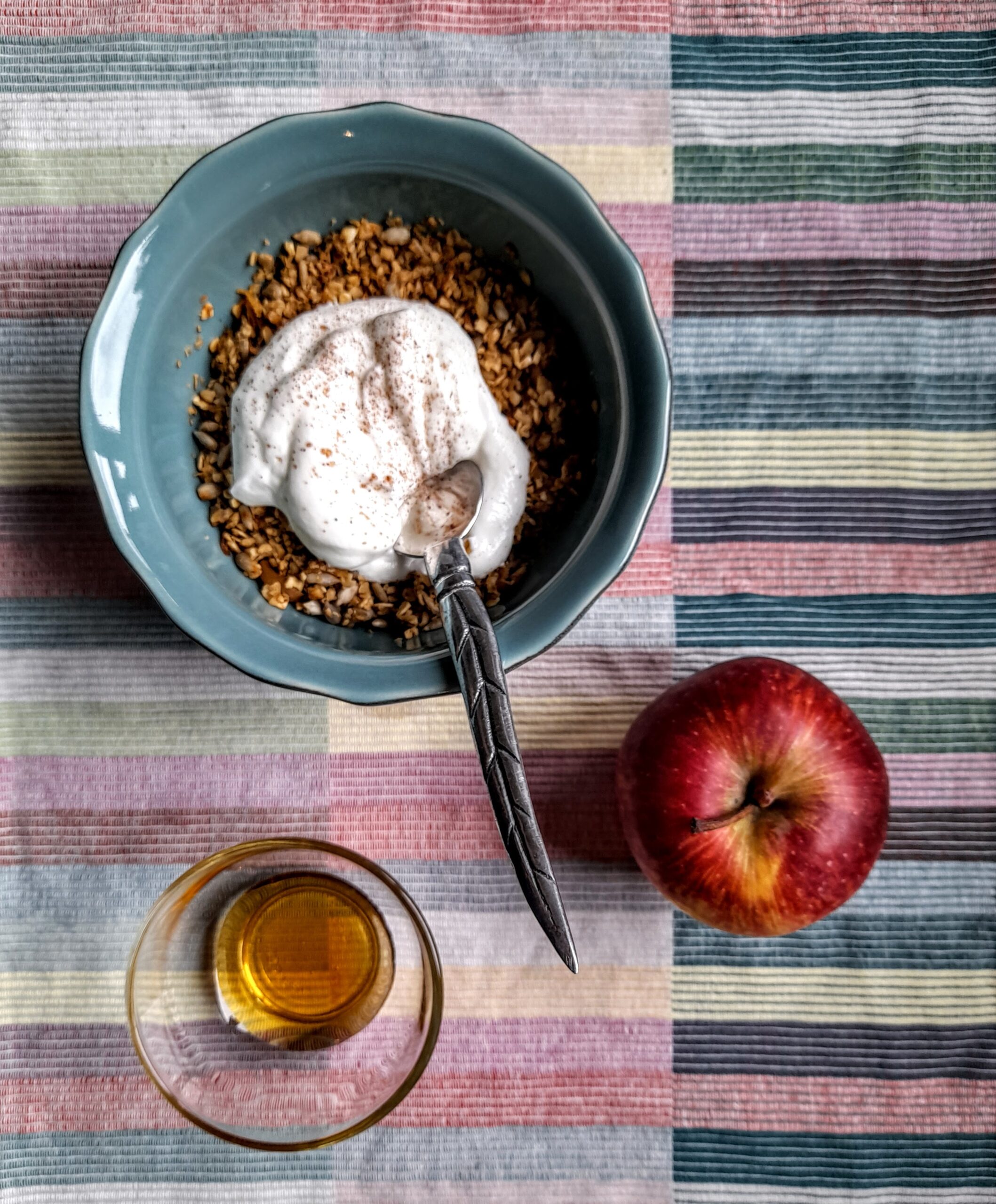
5 Foods For Digestive Health
I want you to take a moment to appreciate the trillions of microbes floating about in your digestive system right now.
As you read this they are chewing up your last meal, processing the fibres, proteins & nutrients and in a very lady like fashion they will convert this fuel into acids that will make or break your digestive function.
Yes that is right, trillions of farting microbes are dictating your health. They decide whether you become bloated, experience IBS, are crippled with abdominal cramps or are singing their praises for making you feel fresh, light, flat bellied and energised.
Each time you eat, you are then in a sense not fuelling you, rather your microbes. This paves the way for new thinking about how and what you eat. If your microbes aren’t a fan of the menu it may lead to bloating, discomfort, IBS, wind. Worse still, if the menu doesn’t change long term conditions like gastritis, ulcerative colitis, ulcers and functional disorders may develop. However if you nourish your microbes, feeding them only the best they will show you love back by giving you more energy, a flat belly, no more bloating and cut out IBS for good.
So, what are your microbes favourite, michelin star, two thumbs up favourite picks for their daily feed? Here are just a few..
1. Stewed Apples
The humble apple, familiar to most and eaten by many is one of your microbes favourite foods. It contains the gut loving soluble fibre pectin (also found in plums and citrus peel). Why? Pectin is converted to short chain fatty acids (SCFA’s) in your large intestine such as bicarbonate and butyrate. These SCFA’s are the main source of energy for the cells lining your colon and help regulate it’s function.
SCFA’s will prevent overgrowth of harmful PH sensitive pathogenic bacteria like Enterobacteriaceae and Clostridia. This is because they regulate PH levels in our digestive system making sure they remain consistent and within normal range. If the PH is too high, you are providing harmful bacteria with a suitable environment to thrive in and we don’t want that.
Keeping your digestive system at the right PH will help your microbes to repair and strengthen the mucosal lining of your digestive system, prevent malabsorption, improve protein digestion, normalize intestinal contractions and prevent IBS like symptoms. Studies have even show a positive influence on the treatment of ulcerative colitis, Crohn’s disease, and antibiotic-associated diarrhea
Apples also promote the breakdown and excretion of excess hormones and by-products through your liver. The fresh stock SCFA’s are oxidized by hepatocytes assisting with the excretion.
So remember Apple –> Pectin –> SCFA’s –> Butrate + bicarbonate –> Lowered PH –> beneficial bacteria flourish –> symptoms reduce.
I recommend cooking the apple skin on so it is gentler on your digestive system and it also allows you to add in other gut friendly ingredients like cinnamon, ginger and yoghurt. Try this recipe here: http://www.joguy.com.au/stewed-cinnamon-apples
Grab your apples, always organic from AboutLife Market Place.
Microbes or collectively known as the microbiome at any one time weigh in at almost 2kgs and are thought to outnumber the number of cells in our body ten to one.
2. Turmeric
Turmeric, that yellow spice which stains all your chopping boards and stays on your fingers for days also stains your insides. This is a good thing as turmeric contains the active polyphenol curcumin which has an affinity with the lining of your digestive tract where it is absorbed. Your microbes love dining on turmeric because it increases the secretion of gastric wall acids and pancreatic enzymes eg. gastrin, secretin and bicarbonate. These acids and enzymes assist in breaking down the food you eat and allow for better absorption of minerals and nutrients.
If you thought it couldn’t get much better than that turmeric also plays a key role in the inhibition of pro-inflammatory cytokines and is an effective treatment in inflammation caused digestive complaints such as chron’s, ulcerative colitis and gastritis.
Turmeric was found to effectively improve dyspeptic symptoms in patients with dyspepsia, as well as maintain remission in patients with ulcerative colitis (UC)’
Curcumin has a significant role in cases of gastric ulcers. An open, phase II trial was performed on 25 patients with endoscopically diagnosed gastric ulcer. Participants were provided 600 mg powdered turmeric, five times daily. After 4 weeks, ulcers had completely healed in 48% patients. The success rate increased over time, with 76% being ulcer free after 12 weeks of treatment. No significant adverse reactions or blood abnormalities were noted
Try this recipe for a gut nourishing morning drink: http://kaleandchocolate.com/recipe/creamy-turmeric-latte/
Always make sure your turmeric is organic, I buy mine from The Source Bulkfoods
3. Yogurt
Yogurt is a probiotic food, we all know that. What you may not know is how this makes it BFF with your gut. Yogurt is made by lacto-fermentation which uses certain beneficial bacteria to turn the naturally occurring sugars found in milk (dairy, coconut etc) into lactic acid. Normally thought of as a by product to excessive exercise, lactic acid is your microbes best friend. It will cleverly manage the pH in the small intestine to make sure it is too low for harmful bacteria to live suppressing their growth. Again we are seeing PH coming up in conversation showing the importance of maintaining it’s balance.
Lactic acid will also assist in breaking down the food you eat, stimulate gut motility and improve the absorption of minerals and nutrients – three key functions to healthy digestion. Consuming yogurt will then reduce bloating, pain, diarrhea, constipation and IBS like symptoms.
Fun fact: Scientists of the early ages like Hippocrates considered fermented milk to be a medicine, prescribing sour milk for curing stomach and intestinal disorders
Try this yoghurt inspired gut loving breakfast recipe below or simply enjoy a scoop of natural yogurt before each meal. https://www.bbcgoodfood.com/recipes/bircher-muesli-apple-banana
My two favourites are Meredith Valley Sheeps yoghurt or Jalna BioDynamic Natural Yoghurt
4. Green Leafy Vegetables
Popeye must have had one happy gut given all the spinach he consumed and new research is now showing us why. A recent study identified an enzyme in our digestive tract that allows our beloved microbes to break down and feed on sugar found in green leafy vegetables. This sugarsulfoquinovose (SQ) is a preferred source of fuel for your digestion and your microbes are a big fan. SQ limits the ability of the less beneficial bacteria to colonize the gut by shutting them out of the prime ‘real estate.’ Essentially fueling the beneficial bacteria and crowding out the less beneficial strands.
You may now have noticed a trend across all of these foods. They all allow the beneficial microbes to flourish and contain the overgrowth of the not-so-beneficial microbes. No wonder then that they reward you by making you feel so good.
There is the matter of oxalates when it comes to spinach that I need to address. Oxalates are a naturally occurring acid, found also in rhubarb, that has an affinity for calcium. It can bind to calcium forming an insoluble salt, also known as a kidney stone. For most this will not be a problem, however if you have a family history of kidney stones be cautious. To reduce the oxalate content of spinach combine it with white cheese or milk (organic of course) or boil it for 1 minutes, the majority of oxalates will be washed away with the water.
How to use green leafy vegetables? Included in smoothies, wilted as a side or chopped and added to a stir fry, roasted vegetables or a stew.
Buy from either About Life Market Place or your local farmers market.
5. Fermented Vegetables
Lacto-fermentation comes to the party again this time to produce fermented vegetables. The sugar and starch within the vegetables, typically cabbage or carrot, are converted into lactic acid. Fermented vegetables differ to yoghurt as they do not require bacteria to be added.
Fermented vegetables neutralise stomach acid. For example when the production of hydrochloric acid by the stomach is low, fermented vegetables will increase the acidity of gastric juices. On the other hand, when the stomach produces too much acid, fermented vegetables will protect the stomach and intestinal lining by lowering the PH. This is THE food for anyone experiencing gastric reflux.
Fermented foods also help the body produce acetylcholine. Acetylcholine is a neurotransmitter that strengthens nerve transmission and limits neural decay. Within the digestive system it helps increase bowel motility and can help reduce constipation. It also helps improve the release of digestive juices and enzymes which break down the food in your digestive tract. Fermented vegetables may therefore be useful to reduce wind, bloating and bacterial overgrowth.
Consume 1 heaped tbsp up to three times daily with meals.
Learn how to make your own Fermented vegetables with Cornersmith.
Keep your digestive health strong by including these 5 foods each day into your diet. They all work to keep your microbes happy and healthy. In turn promote a balanced environment free from bloating, pain, discomfort and IBS. Next up stewed apples & yoghurt and a fermented vegetable & turmeric salad. For reals.
Author
Jennifer Ward, Adv dip Nat, BCom Econ, Masters Repro Med (studying)
Jennifer is a qualified naturopath with a focus on fertility, pregnancy, hormonal imbalances.
Learn more about Jennifer here
Book a session with Jennifer here
To learn more about digestive health or for speaking enquires on this topic get in touch at hello@halsahealth.com.au
Read more:
Pectin and protein absorption: https://www.ncbi.nlm.nih.gov/pubmed/17084594
Geek out on SCFA’s https://www.ncbi.nlm.nih.gov/pmc/articles/PMC3735932/
Turmeric and the treatment of digestive disorders https://www.ncbi.nlm.nih.gov/pubmed/24973984
Learn more about fermented foods here http://phickle.com/all-fermentation-is-not-lactofermentation/
Learn how yogurt is made – https://microbewiki.kenyon.edu/index.php/The_Role_of_Bacteria_in_the_Health_Potential_of_Yogurt
Learn how to ferment your own vegetables – https://wellnessmama.com/663/sauerkraut-recipe/
– SQ sugar study http://www.nature.com/nchembio/journal/v12/n4/full/nchembio.2023.html





